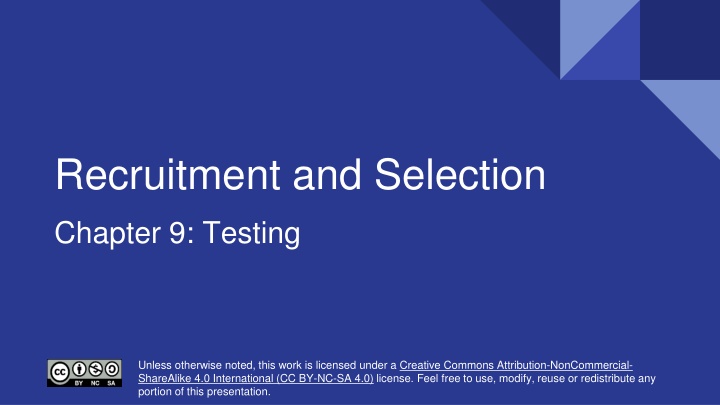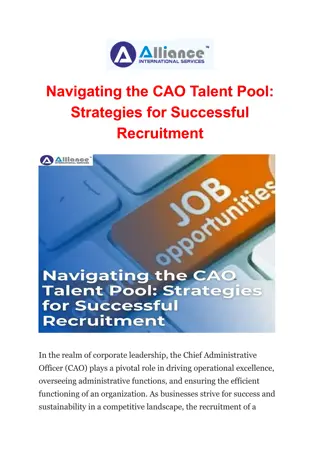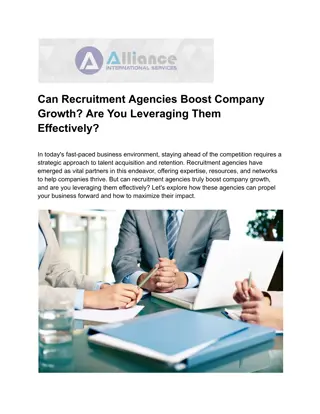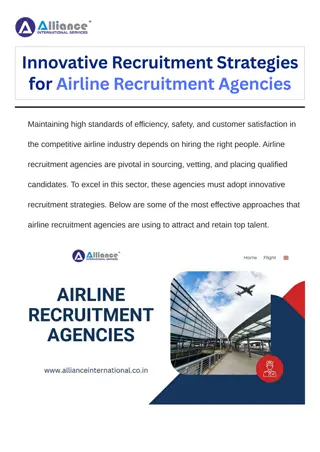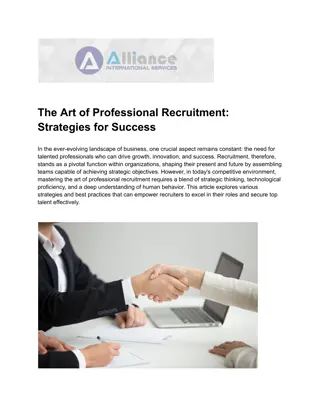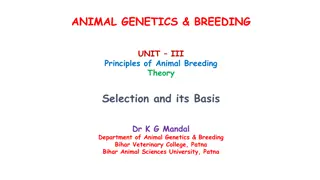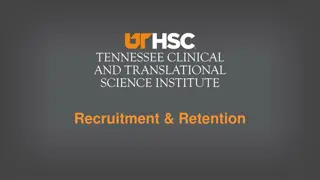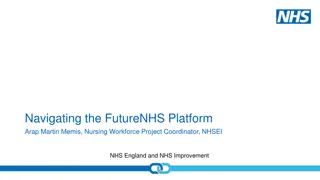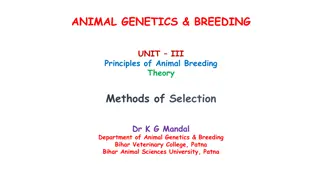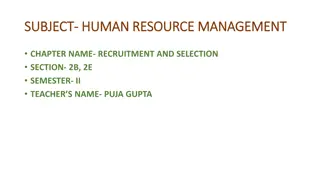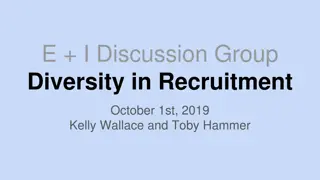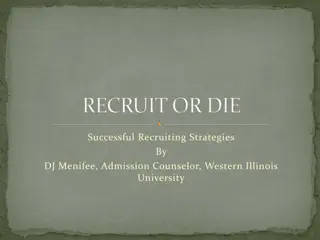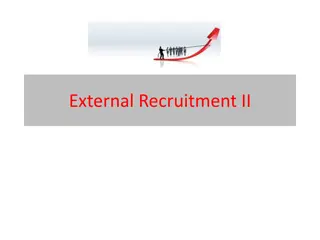Recruitment and Selection
Different types of employment tests used in the selection process, the importance of combining structured interviews with objective testing, and the ethical considerations associated with using such tests in hiring. Learn about cognitive ability tests, aptitude tests, and strategies for enhancing hiring decisions through multiple assessment tools.
Download Presentation

Please find below an Image/Link to download the presentation.
The content on the website is provided AS IS for your information and personal use only. It may not be sold, licensed, or shared on other websites without obtaining consent from the author.If you encounter any issues during the download, it is possible that the publisher has removed the file from their server.
You are allowed to download the files provided on this website for personal or commercial use, subject to the condition that they are used lawfully. All files are the property of their respective owners.
The content on the website is provided AS IS for your information and personal use only. It may not be sold, licensed, or shared on other websites without obtaining consent from the author.
E N D
Presentation Transcript
Recruitment and Selection Chapter 9: Testing Creative Commons Attribution-NonCommercial-ShareAlike 4.0 International (CC BY-NC-SA 4.0) Creative Commons Attribution-NonCommercial-ShareAlike 4.0 International (CC BY-NC-SA 4.0) Unless otherwise noted, this work is licensed under a Creative Commons Attribution-NonCommercial- ShareAlike 4.0 International (CC BY-NC-SA 4.0) license. Feel free to use, modify, reuse or redistribute any portion of this presentation.
Learning Outcomes Identify the different types of employment tests used in the selection process. Explain the importance of combining structured interviews with objective testing to evaluate candidates knowledge, skills, and abilities (KSAs). Describe the steps involved in conducting a job analysis and how they inform the selection of appropriate tests. Discuss the concepts of reliability and validity and their significance in ensuring the effectiveness and legal defensibility of selection tests. Differentiate between various forms of validity, including face, content, construct, and criterion validity. Evaluate the practical applications of cognitive ability tests, aptitude tests, personality tests, and other assessment tools in predicting job performance.
Learning Outcomes Cont. Assess the ethical and legal considerations associated with using employment tests in hiring. Outline the advantages and limitations of personality and behavioural tests in the selection process. Analyze how emotional intelligence tests can measure candidates interpersonal skills and fit within an organization s culture. Formulate strategies for integrating multiple assessment tools to enhance the accuracy and fairness of hiring decisions.
9.0 Introduction Structured interviews can assess candidates' knowledge, skills, and abilities (KSAs), but they can be subjective, time- consuming, and costly. Choosing the right test requires a job analysis to ensure the test aligns with the job's tasks, duties, responsibilities (TDRs), and working conditions. Photo by Amy Hirschi, Unsplash License
9.1 Cognitive Ability Tests A cognitive ability test measures intelligence. The most common type, IQ tests, measure general mental ability. Wonderlic Personnel Tests are tests of general cognitive ability (GCA). They measure a person s ability to learn, adapt, and solve problems, motivation potential, and knowledge and skills. Photo by Tachina Lee, Unsplash License
9.2 Aptitude Tests Aptitude tests are designed to assess an individual's abilities in specific areas, including verbal, numerical, spatial, and mechanical skills. Some tests are tailored to evaluate technical skills relevant to particular fields, such as mechanical aptitude for using specific computer programs or numerical aptitude for math and problem-solving. Photo by NordWood Themes, Unsplash License
9.3 Personality Tests The Big Five personality test examines extroversion, agreeableness, conscientiousness, neuroticism, and openness. Self-assessment statements might include the following: I have an assertive personality. I am generally trusting. I am not always confident in my abilities. I have a hard time dealing with change. Photo by Ben Mullins, Unsplash License
9.4 Emotional Intelligence Emotional intelligence is a person s awareness of their emotions and the emotions of others and how well they can control and express themselves and read those of others. Emotional intelligence is not simply whether or not someone is emotional but rather how well they handle their interpersonal skills and the emotions of others. Photo by J'Waye Covington, Unsplash License
9.5 Evaluating Job Proficiency and Integrity Ajobknowledge testmeasures the candidate s level of understanding about a particular job. Work samples are commonly used in selection to assess skills and competencies. Honesty and integrity tests measure an applicant s propensity toward undesirable behaviours such as lying, stealing, taking illegal drugs or abusing alcohol. Photo by bruce mars, Unsplash License
9.6 Physical/Medical Exams Are the Last Step in Selection Organizations may require physical ability tests for certain jobs to ensure candidates can perform essential duties. Fitness tests and medical exams should occur only after a conditional job offer is made in writing. Pre-employment drug or alcohol testing is allowed in specific cases, such as for commercial drivers, and should also be conducted after a conditional employment offer, as these tests are considered medical examinations. Photo by charlesdeluvio, Unsplash License
9.7 Reliability in Selection Testing Reliabilityrefers to how dependably or consistently a test measures a characteristic. It means that we expect a test to provide approximately the same information each time it is given to the same person, think of it as the test s dependability or consistency. Photo by Alissa De Leva Unsplash License
9.8 Validity in Selection Testing Validity refers to the extent to which a test accurately measures the characteristic it is intended to assess. A test can be reliable without being valid, meaning it consistently measures something, but not necessarily what it should. Photo by Nguyen Dang Hoang Nhu Unsplash License Key types of validity include face validity, content validity, construct validity, criterion validity, and concurrent validity.
9.9 Reliability and Validity Confusion The concept of reliability and validity can be illustrated using archery targets. If an archer consistently hits the same spot away from the bullseye, their shots are reliable but not valid. If the shots are spread out, with one occasionally hitting the bullseye by chance, they are neither reliable nor valid. Only when the archer consistently hits the bullseye are the shots both reliable and valid. Credit: Davin Chiupka, CC BY NC SA 4.0
Key Takeaways Objective Testing vs. Interviews: Testing provides a more objective and cost-effective method for assessing candidates than structured interviews, reducing bias and complementing the interview process to ensure the best candidate is chosen. Choosing a Test: Tests should closely match the job requirements, determined through a job analysis, which identifies tasks, duties, responsibilities (TDRs), and knowledge, skills, abilities, and other characteristics (KSAOs) required for the job. Types of Employment Tests: Include cognitive ability tests, aptitude tests, personality tests, emotional intelligence assessments, job knowledge tests, work samples, honesty/integrity tests, and physical and medical exams.
Key Takeaways II Cognitive Ability and Aptitude Tests: Cognitive ability tests measure intelligence, including verbal ability and problem-solving skills, while aptitude tests assess natural abilities in specific areas, helping determine a candidate's potential for learning new skills. Personality Tests: The Big Five personality traits (openness, conscientiousness, extraversion, agreeableness, and neuroticism) are used to assess a candidate's fit with the job and company culture, though care must be taken with the questions asked. Emotional Intelligence: Emotional intelligence involves understanding and managing one's emotions and those of others, crucial for reducing workplace conflict and enhancing decision-making and interpersonal relationships.
Key Takeaways III Evaluating Job Proficiency and Integrity: Job knowledge tests and work samples assess specific skills and competencies, while honesty/integrity tests evaluate an applicant's likelihood of engaging in undesirable behaviors like theft. Physical and Sensory Ability Tests: Tests for physical abilities are necessary for certain jobs and should be relevant to job requirements, with consideration given to avoiding discrimination. Pre-Employment Drug and Alcohol Testing: Allowed only in limited circumstances and must follow a conditional offer of employment, with accommodations considered for those with addictions. Reliability and Validity: Reliability ensures tests consistently measure a characteristic, while validity ensures tests measure what they intend to. Both are crucial for making defensible hiring decisions.
Key Takeaways IV Reliability in Testing: Test-retest reliability and inter-rater reliability ensure consistency over time and among different raters, giving confidence in the selection process. Validity in Testing: Face, content, construct, and criterion validity ensure tests accurately measure the intended characteristics and predict real-life outcomes like job performance. Practical Application: Combining various assessment tools can better evaluate candidates' skills and reduce the impact of errors from any single tool, improving hiring decisions. Controversy of Personality Tests: While useful, personality tests should be used cautiously, as some argue they can intrude into personal aspects not directly related to job performance.
Key Terms Aptitude Test: Measures a person s ability to learn new skills. It can evaluate specific skills relevant to a job and help determine if an individual s abilities match job requirements. Big Five Personality Traits: A model assessing five dimensions of personality: openness, conscientiousness, extraversion, agreeableness, and neuroticism. Construct Validity: Ensures a test measures the concept it claims to assess, reflecting the true nature of the characteristic. Content Validity: The extent to which a test covers the relevant aspects of the subject or skill it aims to measure. Criterion Validity: The extent to which a test predicts or correlates with real- life success or performance.
Key Terms II Emotional Intelligence: Awareness and management of one s own emotions and the emotions of others, crucial for interpersonal skills and workplace relations. Face Validity: The degree to which test takers perceive a test as appropriate for its intended purpose. Honesty/Integrity Test: Assesses an applicant s propensity toward undesirable behaviours such as lying or stealing. Inter-Rater Reliability: Consistency of test results among different raters, ensuring similar scores are given by various evaluators. Job Knowledge Test: Measures a candidate s understanding and knowledge about a specific job. Knowledge, Skills, and Abilities (KSAs): Attributes that can be measured by interviews or tests, representing a candidate s capacity to perform job tasks.
Key Terms III Myers-Briggs Type Indicator (MBTI): A personality assessment measuring types rather than traits used for learning and team-building purposes. Physical Ability Test: Assesses physical capabilities necessary for specific job requirements, ensuring candidates meet minimum standards. Pre-Employment Drug and Alcohol Testing: Tests administered after a conditional job offer to ensure compliance with workplace standards. Reliability: Refers to how dependably or consistently a test measures a characteristic, ensuring consistent results over time and among different raters. Test-Retest Reliability: Consistency of test scores over time, showing stable results for the same individuals under similar conditions. Validity: The extent to which the scores from a test represent the characteristic they are intended to measure, ensuring the test measures what it is supposed to.
Key Terms IV Wonderlic Personnel Test: A cognitive ability test that measures general cognitive ability, including problem-solving and learning potential. Work Samples: Tasks or examples of previous work used to assess a candidate s skills and competencies.
